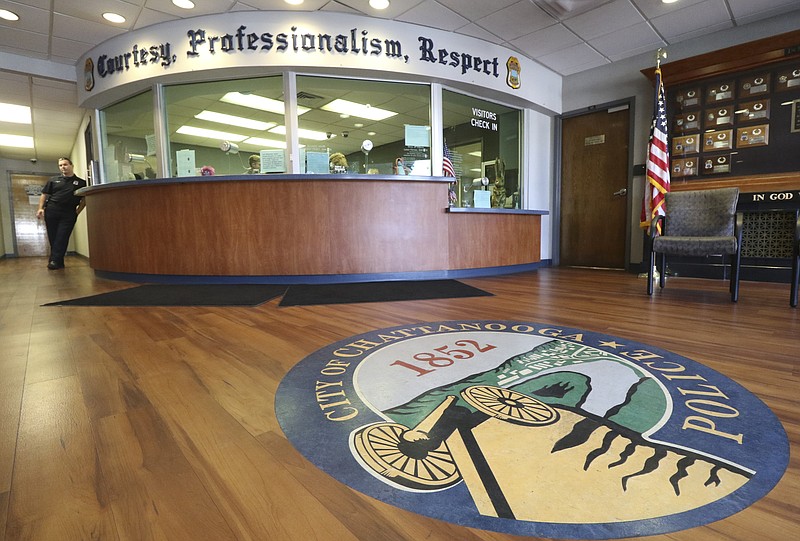 Mayor Andy Berke prepares to sign a new police pay plan Monday at the Chattanooga Police Services Center with dozens of duty officers in attendance, recently appointed police Chief Fred Fletcher observing, at far left, and police union leaders at his side. The mayor said years of service will remove questions of pay status for the ranks.
Mayor Andy Berke prepares to sign a new police pay plan Monday at the Chattanooga Police Services Center with dozens of duty officers in attendance, recently appointed police Chief Fred Fletcher observing, at far left, and police union leaders at his side. The mayor said years of service will remove questions of pay status for the ranks.Six years after 29 Chattanooga police officers sued the city, a dozen of them took the stand this week to testify about alleged age discrimination, pay disparities and raises the officers say the city failed to provide.
The case stems from a years-long dispute about the police department's pay policies, which for about seven years allowed recently hired police officers to earn higher salaries than their supervisors.
In 2014, Mayor Andy Berke revamped the police pay structure to try to level the inequities. Although some police union leaders called then for the lawsuit to be settled in the wake of Berke's fix, the case continued to trial this week in Hamilton County Chancery Court.
Much of the debate in court Friday centered on a 2010 document that laid out new salaries for police personnel. The document listed salary ranges for personnel based on their years of service and their ranks.
The officers who are suing say that the document was a pay plan that promised future salary raises based on experience - that, for example, under the document, a sergeant with two years of experience in 2010 would earn a raise in 2011 when that sergeant reached three years of service.
But the officers never received those future raises and are asking for back pay and compensation for lost benefits.
The city contended that the document was only intended as a one-time pay adjustment for 2010, and that the city never promised to give raises beyond 2010.
"Do you see anywhere on here that it says 'pay plan?'" assistant city attorney Keith Reisman questioned a plaintiff. "In fact, it is very specific about what it is, isn't it? It is the '2010 salary adjustments.' Does it say 2011 on here? 2012? 2013?"
The document did not list other years. But officers testified that the 2010 document looked like every other pay plan they'd received, and that police administrators told personnel the plan would be in place going forward.
"Every pay plan from 1995 to present looked just like that document," Lt. John Chambers testified.
The week's court proceedings also focused on a police career development program that was created for officers in 2008. The program allowed officers to go through training in order to earn higher pay - but it was open only to officers, and was not available to sergeants, lieutenants or other ranking personnel.
That meant that officers who went through the program were able to earn higher pay than their ranking supervisors who were not able to go through the program, even though some officers had significantly less experience on the force.
The police who are suing allege that the program amounted to age discrimination because the ranking supervisors were, on average, older than the officers. They said the program intentionally was aimed at young officers.
Reisman argued for the city that age did not affect the way particular personnel were treated. The career development program was open to all officers, regardless of age, gender or race, he emphasized. And ranking supervisors were not treated differently because of their age, he contended.
"You were treated the same when you were 39 as when you were 40?" he asked Lt. Craig Joel, a plaintiff.
"Yes, because I was denied the same opportunities at all those ages," Joel said.
The trial will continue Monday at 9 a.m. in Chancery Court.
Contact staff writer Shelly Bradbury at 423-757-6525 or sbradbury@timesfreepress.com. Follow @ShellyBradbury.
